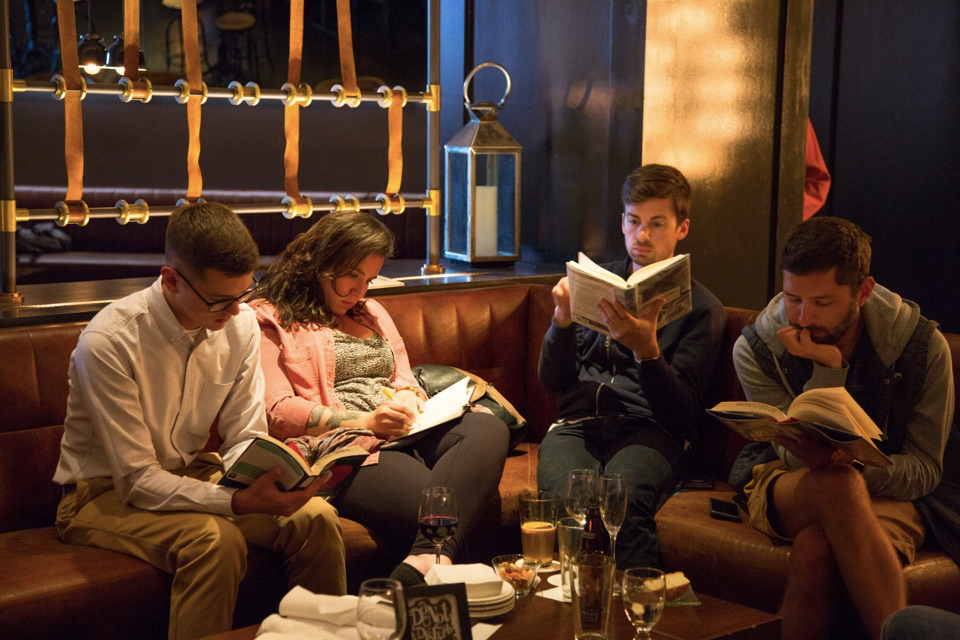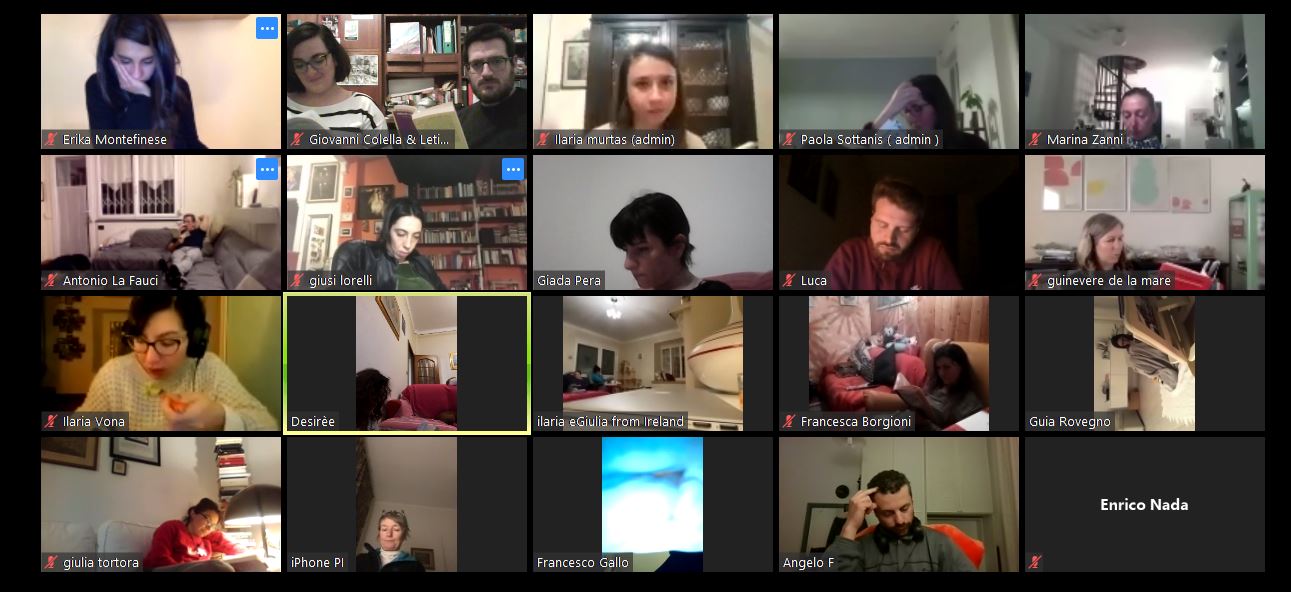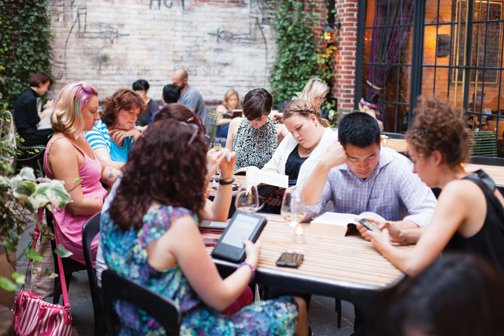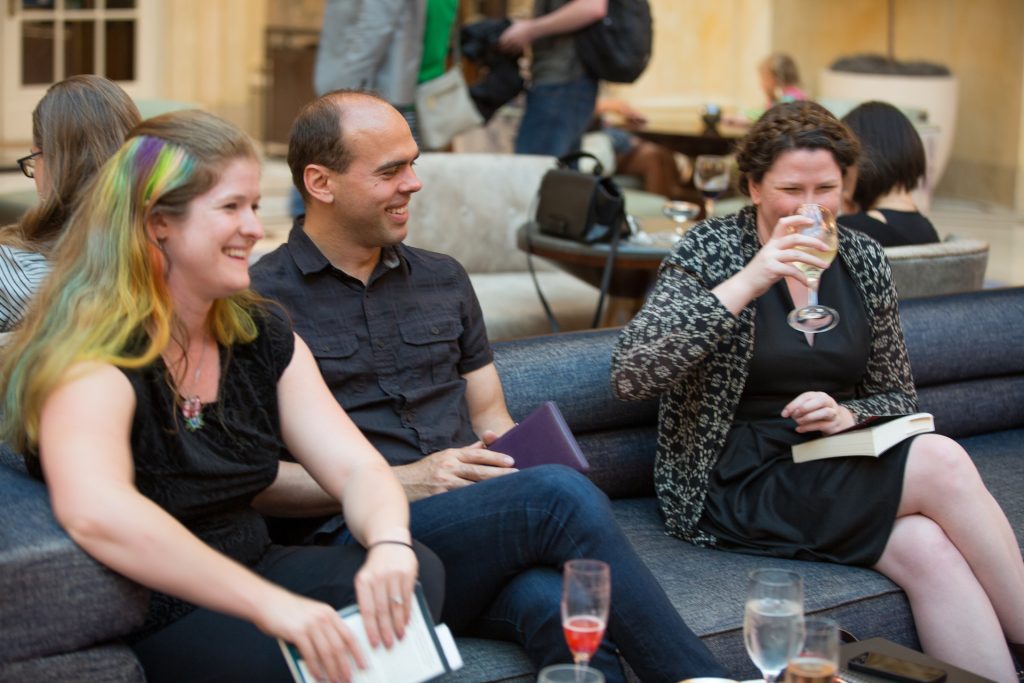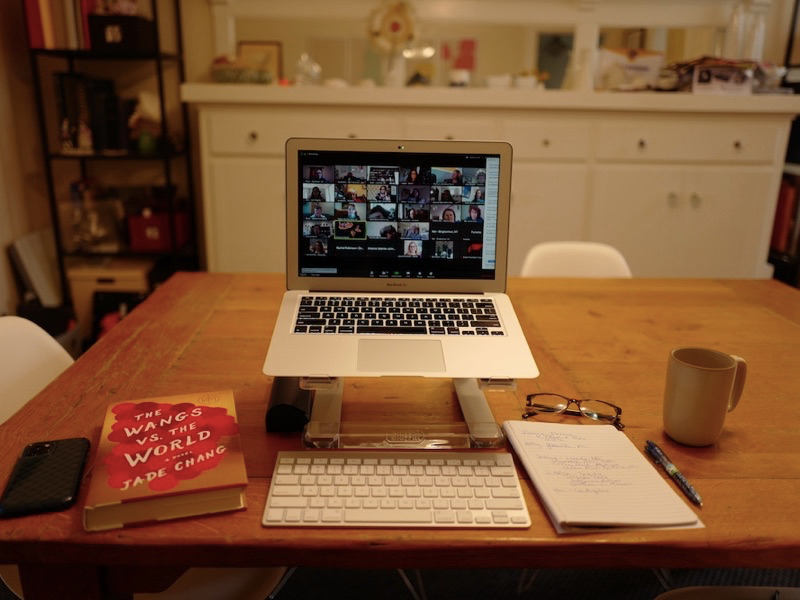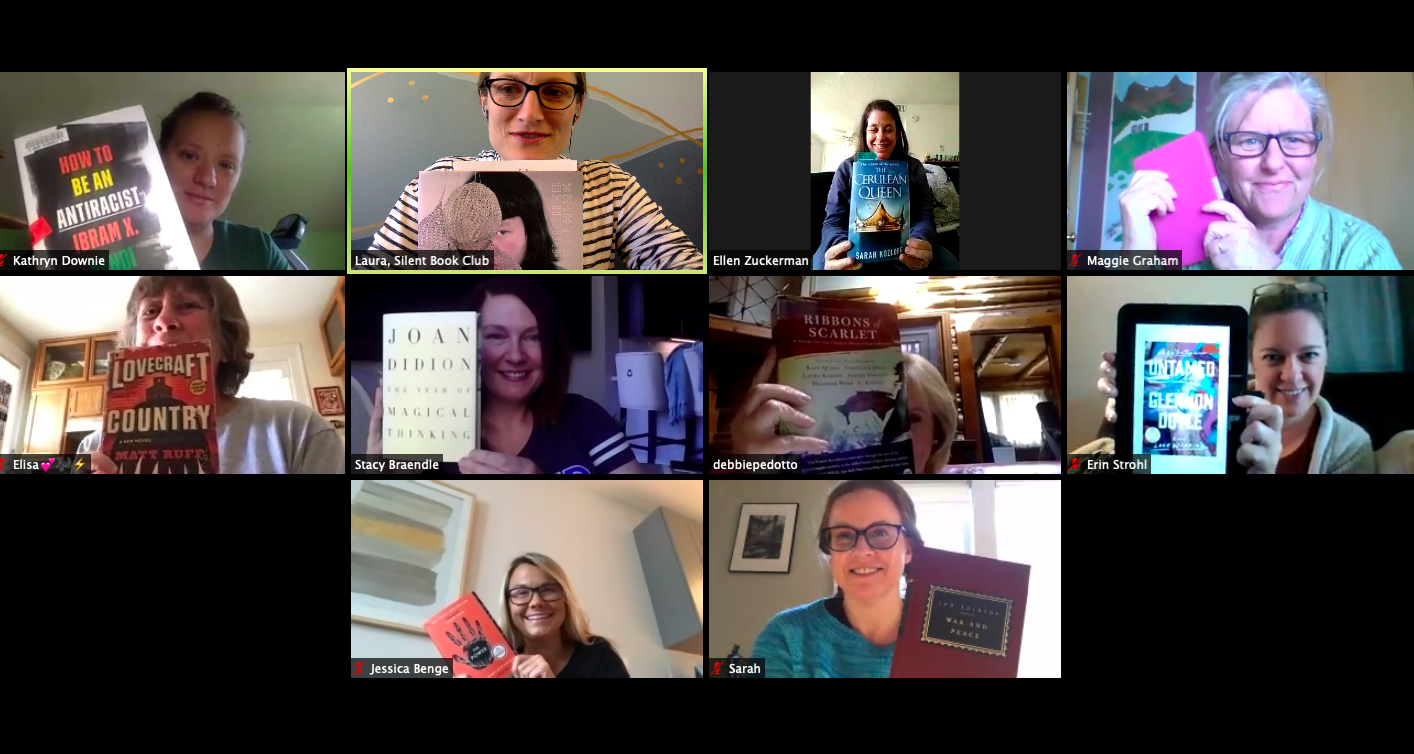Book clubs can be brought up as one type of hobby-based gathering traditionally seen in the United States. An ordinary book club will issue an assigned book that the participants all read, then they will hold a meetup to share their opinions, including their impressions and thoughts. There are some people who enjoy this style. Yet conversely, there are a number of such clubs that see members repeatedly join and leave the group, and there is no shortage of people frustrated with such arrangements. There are a number of reasons for this, such as claims that “The book just didn’t grab me at all, so reading it was a chore and I just couldn’t turn the page” and “Reading a book with a deadline reminds me of assignments from my student days, which just stressed me out.”
But there is a club that completely does away with the factors that stress people out seen with conventional clubs, where members can enjoy solo activities and reading simultaneously. It’s called the Silent Book Club (SBC), which originated out of San Francisco in the United States. It has the unique feature that participants bring in their favorite books and read them silently. SBC was started in 2012, and now has more than 240 chapters all over the world throughout the West, Asia (including Japan), and beyond. We talk with Laura Gluhanich, one of the founders of SBC, about the influence the club has internationally and its connection with solo activities.
2.Currently, they’re all participating online.
−−How did you go about spreading your SBC activities, which have fascinated readers all around the world?
Laura Gluhanich (Laura below): From 2012 to 2016 two of us, myself and one other founder named Guinevere (de la Mare), had a club that friends would sometimes drop in on. Later on, friends who moved to other states from San Francisco would spread it by creating chapters in their own respective areas. From there, we started getting inquiries from people who were complete strangers who wanted to create their own chapters, and it spread worldwide. It feels like over the past four years the club has rapidly become huge and things have gotten interesting. I get inquiries from people who heard about SBCs somewhere or saw an article reprinting an interview who say, “I want to start a chapter in the area where I live, but can I do that?” And to them my answer is: “Of course! Just decide on a time and place and invite your friends. It’s simple.” I think one of the great things about it is that it’s so easy to start one.
While it’s an opportunity to connect with people, the objective is reading. So if you were to look around you see other participants arriving on their own. Even though everyone is reading the books they want to read, it’s a comfortable and cozy space. For people who want to do something on their own but at the same time are seeking connections and a community with other people, SBCs can offer them both of these. People all around the world are forming emotional bonds with one another while reading in silence. Seeing people meeting up and connecting with one another in various different countries and regions through actual meetups and over social media has been surprising, but also absolutely delightful at the same time. It will be a lot of fun to carry on with these activities.
−−What would you say the definitive difference is between reading in an SBC and reading completely on one’s own?
Laura: That’s an interesting question. With an SBC each person is reading the books that they like, but they can also connect with people who love reading just the same as they do. If you’re just reading on your own, you can’t exactly connect with other bookworms. With an SBC, after reading there is time for talking with the other members about the book you just read. This makes them venues for forging connections with other people. Since people who read all sorts of different genres like history, graphic novels, fantasy, science fiction, and nonfiction gather together in the same place, they also serve as an opportunity for people to hear someone else talk about books they had never heard of before and think “That book sounds so interesting!” This is a point of departure from ordinary book clubs. That’s because ordinarily these clubs work by having everyone read a designated book. Speaking for myself personally, I don’t like when someone tells me to do something. So while you have a large number of people all reading together, there are absolutely no rules imposed on them by the SBC.
4.San Francisco. Having a good time chatting about each book.
−−The SBCs are still active virtually as well, right? What are the particulars behind how that came about?
Laura: That’s because last year one member told us that they wanted to create a chapter that was exclusively virtual. From there, they created a Facebook group for their virtual chapter and began holding meetups. The advantage of this chapter is that anyone can participate no matter where they live around the world. I think they do some amazing things that can only be done virtually. Since then the coronavirus pandemic has hit, and various chapters like those in Denver, Italy, and Japan began holding virtual meetups. Even when people are alone in their room they can still connect with people through reading and discuss their favorite books. It’s fun to feel like you are a member of a community no matter where you are. Currently, about 30 chapters are holding meetups virtually.
−−While people gather together in the same place, the central focus isn’t on conversation. I got the impression that they resembled meditation or a yoga class.
Laura: Through yoga and meditation people share things like the same space, breathing, and energy, while with SBCs through reading they share the same atmosphere and space with other people. So perhaps they resemble each other in some ways. I think the same holds true with the virtual gatherings as well. While these are gatherings of people who all share the same hobby, the fact that people read books they chose themselves at their own pace means they could be described as solo activities. Since there are no rules, even though people are part of a community they are free to do as they please of their own accord.
Most people around the world are not completely introverted or extroverted, but have a mix of both personality traits. I think that SBCs are one of a small number of places that cater to these mixed personalities. While there is time for discussion, if someone doesn’t feel up to it they don’t have to participate, and they are free to quietly read their book at their own pace. There are even some people who belong to other book clubs who read the assigned books from those clubs at SBC (laughs).
Online communities are similar. Someone writes to say that they’re looking for recommendations in a certain genre, and someone else posts “This is a good book.” Then this connects with other people who saw the post who think “I had never read that genre before, but that book was great.” We create opportunities where people can try out different genres and go on reading adventures without forcing them.
−−You also hold club meetings to which you invite authors.
Laura: If a publishing house or an author themselves reaches out and there’s an outpouring of interest, then we’ll move forward with planning something. But these are not structured in a way that we tell people they have to read a certain book. Rather, instead of focusing on the author him or herself, we focus on topics like theme-setting, their approach, or their style of writing. Also, we endeavor to take up books from a diverse range of people of various different ethnicities and cultural backgrounds. The other day our guest was Kristen Millares Young, the author of Subduction: A Novel. The protagonist of the story is a Latina woman who works in a region where indigenous people live in the northwestern part of the United States. In the story multiple cultures collide and become one. In this sense, it has sparked opportunities to give thought to the current state of the world, particularly the current state of the United States, which makes for an extremely interesting story. This year we plan to widen the scope of genres still further to take up biographies, fiction, satire / humor, young adult books, and more.
−−The novel coronavirus pandemic has forced some people into situations in which they have to spend time alone due to lockdowns. Have there been any changes within SBC due to this?
Laura: One very significant change has been the shift to online. Lots of people have begun looking for communities upon going into lockdown, but there are limitations when it comes to seeking out new things while you’re stuck at home. Chapters in Australia, and recently Denver have resumed holding meetups by ensuring safe conditions by maintaining social distancing outside in accordance with their respective local regulations. I feel that meeting up with other people through SBCs, whether this is done in person or virtually, serves as an opportunity for us to reclaim what makes us human. Moving forward, I want to continue to provide people with opportunities to connect with one another.
−−Do you feel that “quiet time” spent reading lets people discipline their mind and makes them introspective?
Laura: I think so, and personally I consider myself to be a very introspective person (laughs). I feel that there is some individual variance in how much time each person needs, but if you feel like you need some “quiet time” then it’s important that you give priority to making time for this. And while it may be a cliche, there are always tons of things happening all around us and there are so many things that distract us, like our computer and smartphone screens, notification sounds, and so on. But our brains are not set up in a way that allows us to handle all of these. So for example, while I had been reading on a Kindle I had to give it up for a while. I feel that we need some time to get away from digital devices and the noise and clamor of our everyday lives.
For me, reading is an opportunity to encounter and get involved in unknown stories and human lives. There is research indicating that people who read fiction tend to have a greater capacity to empathize with others than do non-readers, so reading can temper our capacity to empathize. Having this capacity to empathize lets you understand people with sensibilities that are different from your own, forge emotional bonds with them, and learn something from them. Of course reading is something we do for amusement and as an escape from reality. But I feel that we gain so much from it, and that time spent entertaining flights of fancy while following a story is time that is incredibly well-spent.
If people see an event that piques their interest on our website or blog then I want them to be able to readily take part. It’s a great opportunity to meet people you don’t know and learn about what sorts of books other people are reading. Here, people are always welcome.
Silent Book Club
A book club started in 2012 by Guinevere de la Mare and Laura Gluhanich, who were friends and neighborhood companions, based on reading in a neighborhood bar in San Francisco. This club, founded out of the sense that reading with friends can enrich and bring joy to people’s lives, currently has more than 240 chapters worldwide. This information is updated weekly by volunteers. The club provides forums where people can actually gather together to read, rather than interacting over social media, to share a live atmosphere with one another.
https://silentbook.club/
Pictures provided by Silent Book Club

